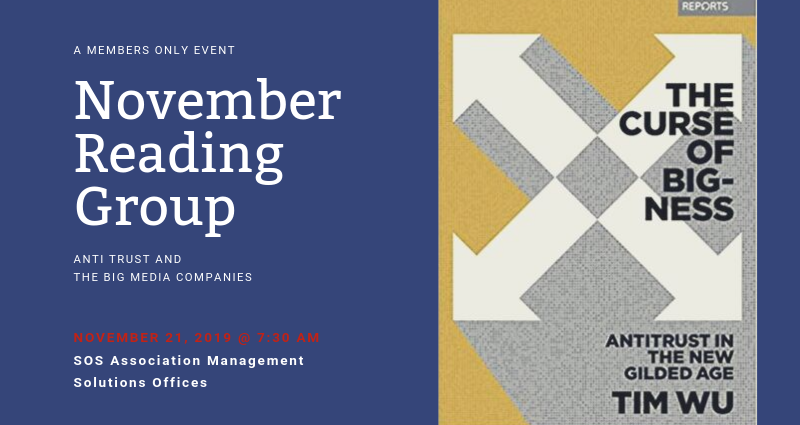
November Reading Group
The Curse of Bigness:
Antitrust in the New Gilded Age
by Tim Wu
Schedule
Thursday, November 21, 2019 | 7:30-9:00 am
Venue
7729 E Greenway Road, Suite 300
Scottsdale, AZ 85260
(one block south of Greenway Hayden off 73rd St)
Finally, please park only in the parking spaces marked ‘visitors’, not the numbered parking spaces. If the spaces are full, you may park on the street.
Topic of Discussion
The recommended book is by the law professor, Tim Wu, The Curse if Big-ness, 2018 at paperback price of $15. Search second hand and I am sure you can buy for considerably less or rely on other sources of information.
As you know Google dominates the search engine business, Face Book dominates social media, Amazon dominates retail On Line and Apple dominates smart phone apps. Undeniably, these companies are huge and incredibly influential, but are they harmful? The Sherman Anti Trust Act of 1890 under the administration of President Benjamin Harrison outlawed companies restraining trade. Its focus was the consumer who would be hurt by too high pricing, too little quality and too little services versus a more competitive economy with more players who presumably would lead to greater consumer welfare. With the support of the Progressives in the early years of the 20th century and huge support of Theodore Roosevelt, the Clayton Anti Trust Act was later passed in 1914 during the Wilson Administration. This legislation followed its predecessor and created the Federal Trade Commission, but directly excluded labor unions and ultimately sports organizations and Hollywood. Monopolization of labor and actors under contract law meant total control over these employees. Indeed, the Biltmore was an escape destiny for actors fleeing temporary contract control from the film studios of Hollywood.
Today, the Big Tech media companies mentioned above are under attack as being too concentrated both in the United States and abroad. However, does their size harm the consumer, other producers and governments? Is it true these companies have kept prices too high, provided too few services and lower quality? My guess is most PCFR members would deny this allegation and would claim they are happy with all their innovations. So what’s the problem?
Well, like much political opposition today, the attack is not centered on economic issues where economic harms are difficult to quantify, but more on social justice issues, like invasion of privacy and too much control of private information. The Big Tech Media companies are now facing growing investigation by Congress and ultimately vigorous litigation in the courts.
However, a good student of economics could argue that Big Tech Media may provide a serious economic problem in that, even at prices of zero, they still charge too much? How could that argument be made? Well, it is true that much of their pricing runs from very low to zero, however, they gather tons of information from their users and this information gets over to lots of advertisers. The advertisers pay the Big Tech companies ‘big bucks’ and the companies are very profitable (look at their earnings and stock prices), so an argument could be made that prices should be lower and to be more outrageous, that excellent economics student could argue that these companies should pay us for all the information we give them. HMMM! Think it over.
What a fascinating topic and we need your help to discover the truth! So do not miss this upcoming session.
